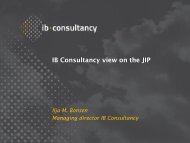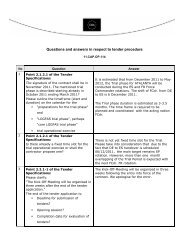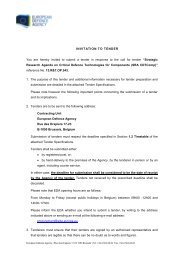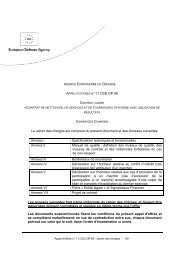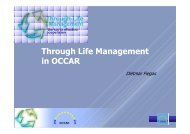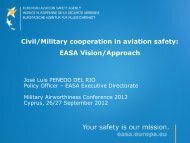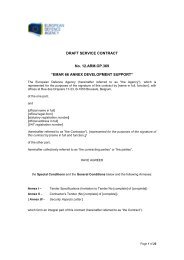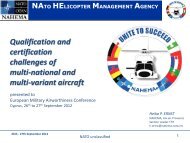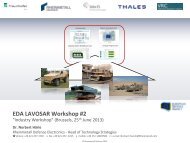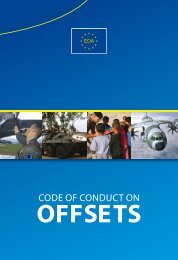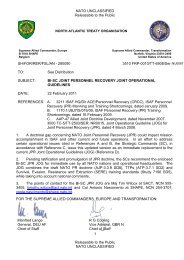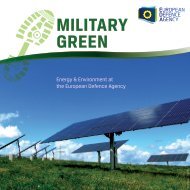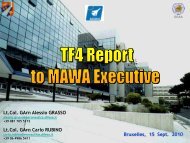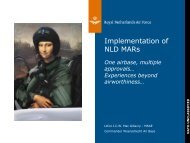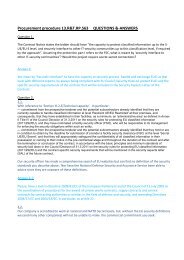capability development plan - European Defence Agency - Europa
capability development plan - European Defence Agency - Europa
capability development plan - European Defence Agency - Europa
You also want an ePaper? Increase the reach of your titles
YUMPU automatically turns print PDFs into web optimized ePapers that Google loves.
52<br />
THREATS AND CHALLENGES DERIVING FROM<br />
POTENTIAL ADVERSARIES<br />
Workshop B<br />
The above is considered as a plausible, but not predictive, summary of a possible generic threat<br />
assessment to inform Workshop C. It is based upon the output of the successful Strand B Workshop B<br />
but repackages it (as set out below) in an attempt to better assist and benefit the participants of<br />
Workshop C. Providing a more flexible focus was the main objective. Although re-packaged it is<br />
considered as a faithful representation of the outcome of the workshops proceedings. Annex A is<br />
structured by possible Principles of War in the Information Age. Readers should try not to focus on the<br />
format but instead consider how these issues could shape future potential <strong>capability</strong> trends and<br />
characteristics in the 2025 timeframe. Annex B tries to provide broad indications of specific <strong>capability</strong><br />
trends for potential regular and irregular adversaries. Again it is trying to paint of picture for the<br />
participants of Workshop C and should be read in that context.<br />
PRINCIPLE OF KNOWLEDGE AND IGNORANCE<br />
Knowledge concerns the information and intelligence we have about ourselves and the adversary.<br />
Ignorance is the converse of knowledge - either because we do not know, cannot know or choose not<br />
to find out. The balance of knowledge and ignorance has dominated warfighting throughout history and<br />
will continue in the Information Age. Today, the principle of knowledge can be based upon the<br />
proposition that given time and resource, we can know everything about our adversaries but as conflict<br />
is competitive, to collect, fuse and analyse the whole plethora of information may not be time, or cost<br />
efficient.<br />
Therefore, to achieve a balance between knowledge and ignorance forces must consider the issue of<br />
economy. Ignorant adversaries must resort to massing, having to confront their enemy’s strengths in<br />
contests of attrition rather than manoeuvre and dislocate. Ignorant forces must react and not capitalise<br />
on opportunity, spending considerable time and resource on protection and security rather than<br />
seeking positive activity in order to achieve their objectives. But the ability to attain knowledge only<br />
exists as a system of systems. It is not built upon computers, communications, ISR sensors, networks<br />
or focused training. It is all these things and much more - welded together by agreed and coherent<br />
doctrine.<br />
1. Globalisation and the technological revolution will enable adversaries to dramatically improve their<br />
situational awareness. They will have access to the latest technological solutions and applications,<br />
which is likely to make it possible for them to gain information superiority momentarily, either by time,<br />
function or position.<br />
2. Identification of Friend or Foe will be more challenging. Reliable target data and target identification<br />
© sxc.hu<br />
will become more difficult due to the adversary use of advanced solutions (modern technology /<br />
deception means), unconventional modus operandi, a lack of discrimination between military and nonmilitary<br />
activities.<br />
3. In this information struggle, information assurance and verifying that one's own information is reliable<br />
will be essential.<br />
4. An increase in confused battle space may be predicted, which may lead to losses caused by<br />
'Friendly Fires'. The risk for EU forces being targeted inadvertently will increase in interpositioning<br />
missions where the potential for misidentification of EU units by conflicting parties is likely to be high.<br />
5. Within different cultural environments, HUMINT will remain a key challenge for expeditionary<br />
operations. The adversaries 'playing at home' will create a natural and absolute advantage for them.<br />
This will include gaining intelligence on their logistic footprint and tracking their supply pipeline. This is<br />
likely to be small in most cases and therefore is likely to become a more serious issue.<br />
6. Adversaries may have versatile operational/organisational structures but will be able to create their<br />
own network structures, even conduct their form of network enabled warfare. It will be a challenge to<br />
prevent adversaries from collecting, processing and distributing intelligence.<br />
7. Their communications are likely to be both varied, and flexible, with considerable redundancy in<br />
FUTURE TRENDS FROM THE CAPABILITY DEVELOPMENT PLAN



